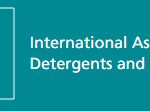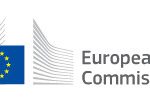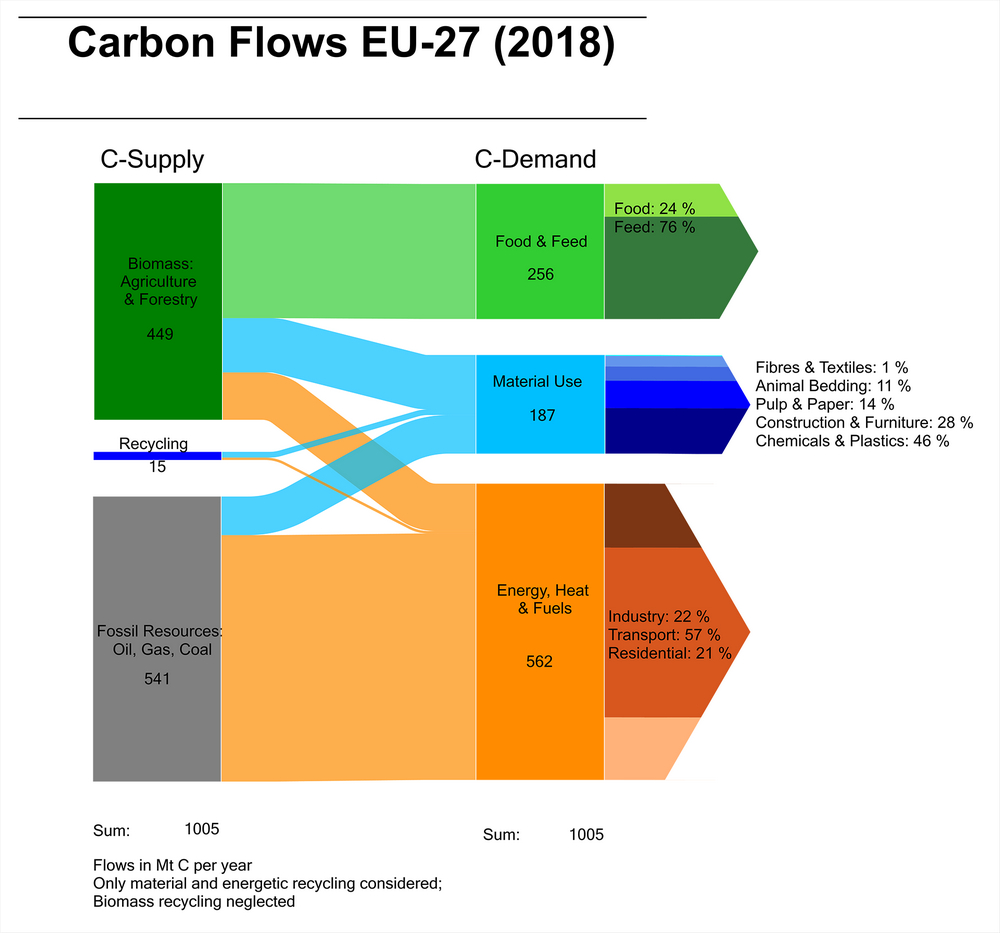
Carbon demand for EU-27
The need for bio-based carbon in a sustainable future
The need for bio-based carbon in a sustainable future – Studies on support to R&I policy in the area of bio-based products and services
“Carbon Economy” project illustrates the role of bioeconomy in a low fossil carbon economy for Europe, today and in the future Carbon is the basis for a multitude of processes on our planet, many of them as parts of human economic activities. However, in a time, when “decarbonisation” is on everybody’s lips as the solution to the climate crisis, it seems almost ironical to run a project on “carbon economy”.
What were the reasons behind this focus and what are the objectives achieved?
Contrary to the energy sector, there are several sectors which cannot be decarbonised. These are the food and feed sectors as well as chemical and material sectors. Proteins, fats and carbohydrates contain carbon; organic chemistry is defined by the use of carbon and cannot be decarbonised; also, all usages of wood for example will always be based on carbon. In the context of the climate crisis, one needs to be more specific and say that fossil carbon is the problem. Bio-based carbon from plant and animal sources – constituting the bioeconomy – as well as other renewable carbon sources can constitute a viable alternative to fossil carbon. COWI (DK) and nova-Institute (DE), supported by University of Utrecht (NL), have recently finished a study for the European Commission (DG RTD) that aimed at exploring the role and potential of renewable carbon in our economy towards mitigating climate change.
The study is freely available here: https://renewable-carbon.eu/publications/product/carboneconomy- studies-on-support-to-research-and-innovation-policy-in-the-area-of-bio-basedproducts- and-services/.
The study addressed the question, how much carbon is needed in Europe in 2050 and how it can be provided sustainably. For the first time, a comprehensive and holistic mapping of carbon flows on a global and European level has been conducted to create a solid knowledge base.
Future scenarios for the European demand and supply have been explored, showing how carbon flows can be designed more sustainably and circular, reducing the dependence on fossil carbon sources. Furthermore, current legislative drivers and barriers for the realisation of such an economy have been identified and promising innovations and novel technologies have been Institute for Ecology and Innovation evaluated. Besides, hands-on case studies of ten cities and regions have been conducted to discover, how urban biowaste and waste-water sludge can be utilised in a circular bioeconomy to make high-value products.
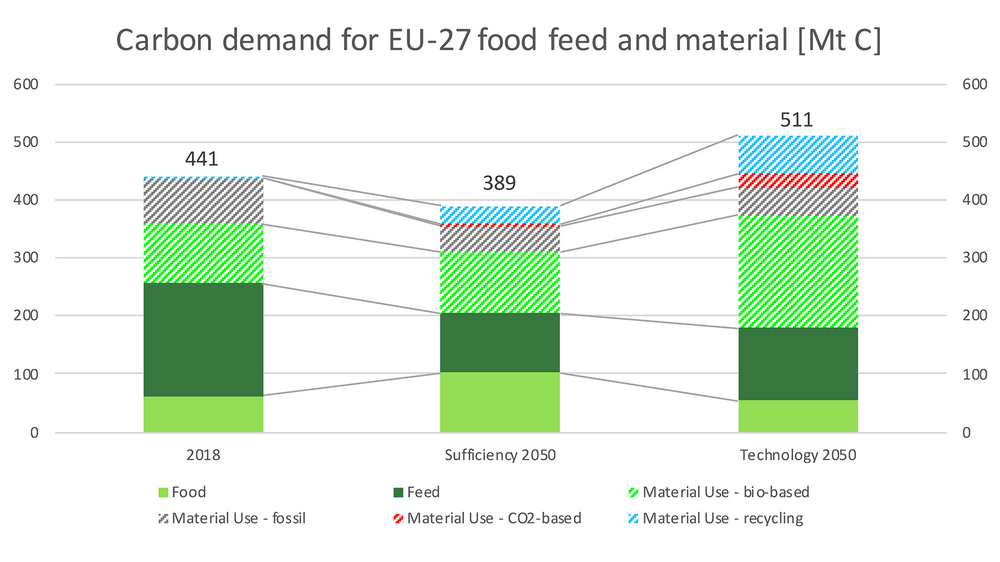
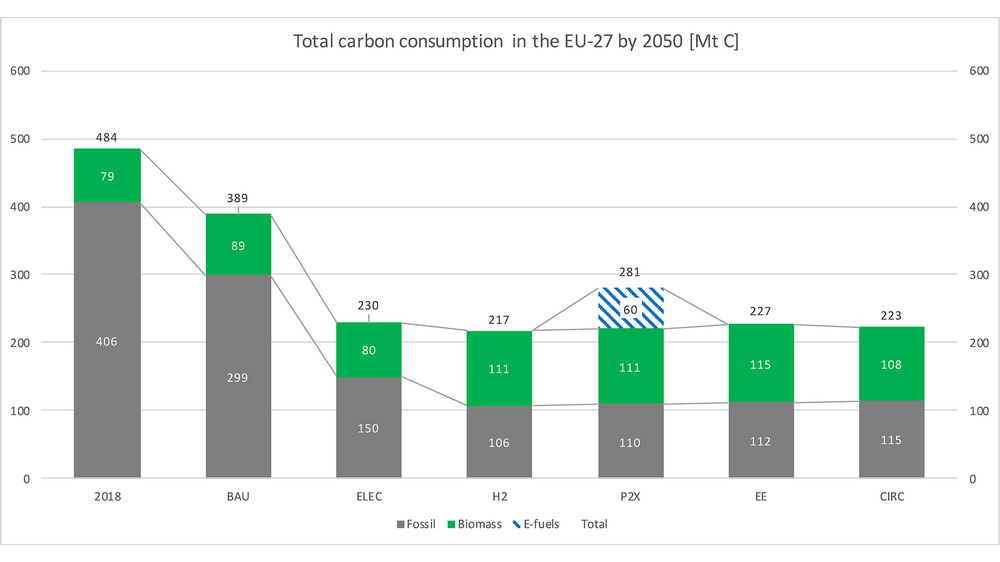
The results and the knowledge will be shared on various channels – for experts as well as general public. Key messages summarise the main outcomes of the study:
- For the transformation from fossil to renewable resources, the consideration of carbon flows in addition to overall material flows is highly relevant due to diverging properties of alternative fuels (e.g., by heating value) and materials (e.g., by dry matter or by carbon content).
- The largest share of the EU-27’s carbon demand is used for energy, heat, and fuels (56%) with a fossil share of 85%, see figure 1. The second largest consumption of carbon resources is food and feed (23%) where only carbon from biomass is used. The third sector are chemicals and materials (17%) with a fossil carbon share of 39%.
- Six scenarios for the EU-27 energy sector in 2050 have been adopted to determine the carbon demand and supply, see figure 2. All scenarios imply a reduction of the annual demand for fossil carbon from 406 Mt C (2018) to between 299 Mt C (in the businessas- usual scenario) and 106 Mt C (in the hydrogen scenario).
- Two scenarios for the EU-27 food, feed and material sectors in 2050 have been developed to determine the corresponding carbon demand and supply, see figure 3. For plastics and chemicals, the share of fossil supply decreases for both scenarios from 91% (2018) to between 50% (Sufficiency scenario) and 30% (Technology scenario).
- A sustainability assessment has been conducted, showing that the business-as-usual scenario lacks behind the other five scenarios for the 2050 energy sector. For food, feed and materials, the majority of sustainability indicators show positive trends compared to today for both of the examined 2050 scenarios.
- In order to assess existing barriers and drivers for the use of urban biogenic waste streams, current amendments to relevant pieces of EU legislation have been analysed. Effects on the use of waste streams for the production of bio-based products, have been summarised.
- An evaluation of technologies for a transformation towards a low fossil carbon economy for the material use of carbon has been conducted. For each of six product groups promising technologies have been identified. Some findings are that electrochemistry is highly promising for polymers, fine chemicals and hydrogen production. Microbial systems have potential for bulk chemicals & fuels, proteins, polymers and fine chemicals.
- Case studies regarding the current state of biowaste and wastewater sludge utilisation in 10 European regions show, that each region has taken clear measures to improve the situation. The measures are manifold reaching from encouraging home-composting (Cluj-Napoca, RO, and Łódź, PL) to subsidies for biomethane production (EmiliaRomagna and Milan, IT) to ambitious recycling targets (Turku, FI).
- In some of the examined regions, biowaste streams occur but aren’t valorised while in others, the technological capacity to process biowaste exists, but there is not enough input. Enhancing cross-border alliances through cluster networks would result in a wellbalanced bio-based sector with sufficient inputs and outputs.
nova-Institute is a private and independent research institute, founded in 1994; nova offers research and consultancy with a focus on the transition of the chemical and material industry to renewable carbon: How to substitute fossil carbon with biomass, direct CO2 utilisation and recycling. We offer our unique understanding to support the transition of your business into a climate neutral future. nova-Institute has more than 40 employees.



